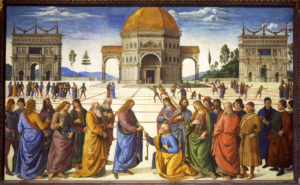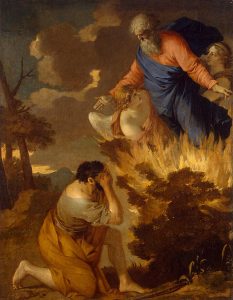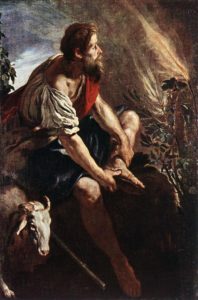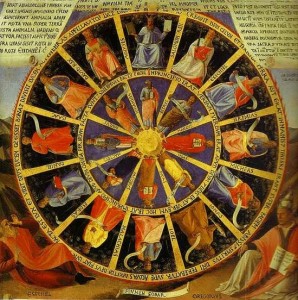Thoughts on Sunday’s Lessons for Aug. 27, 2023
First Reading (Track One): Exodus 1:8-2:10
For the rest of the season after Pentecost, we will follow the narrative of Moses and the chosen people out of slavery and through the desert for 40 years until they reach the Promised Land.

Christ Giving the Keys of the Kingdom to St. Peter (1481-83). Fresco by Pietro di Cristoforo Vannucci (“Perugino,” 1450-1523), Sistine Chapel, Vatican City, Rome. (Click image to enlarge.)
Our Gospel readings will recall the journey of Jesus to Jerusalem and the cross. In the first reading, years have passed since we left Joseph and his brothers, and Pharaoh no longer knows of Joseph or the work he did to save Egypt. Now the Egyptian leaders are afraid of the Hebrews, who have grown in numbers and are now perceived as a threat. Pharaoh tries to have all the Hebrew baby boys slaughtered at birth, but the infant Moses escapes and is adopted by Pharaoh’s own daughter.
First Reading (Track Two): Isaiah 51:1-6
In a metaphor that may remind us of Jesus’ response to Peter in today’s Gospel, Isaiah reminds the people that they were hewn from rock and dug from a quarry in their descent from Abraham and Sarah and their children. God promised to bless Abraham and make his offspring as numerous as the stars, and that promise has been fulfilled. Even if they are in exile now, God will deliver them; God’s justice will be a light to the people, and their deliverance will come soon. Earth will wear out like a garment and the heavens will vanish like smoke, but God’s deliverance and salvation are forever.
Psalm (Track One): Psalm 124
Recalling the time that the people were delivered from slavery in Egypt, the Psalmist sings out a hymn of thanksgiving to the God who protected them through the fear and danger of their exodus. We remember how the Red Sea waters might have overwhelmed them in a raging torrent without God’s protection. Then, in a beautiful metaphor, we envision the people as a bird pursued by a hunter, escaping from a broken snare. In celebration we sing, “Our help is in the name of the Lord.”
Psalm (Track Two): Psalm 138
Echoing the hope for return from exile and eventual salvation that we heard from Isaiah, today’s Psalm thanks and praises God for love and faithfulness. When we called, God answered us and gave us strength. Although God is high, God cares for the lowly; God keeps us safe when we walk in the midst of trouble. The love of the Lord endures forever, and God will not abandon the works of God’s hands.
Second Reading: Romans 12:1-8
Having made his case to the Christians of Rome to live and worship together in love, Paul moves on to urge them to devote their minds and bodies as a living sacrifice in their spiritual worship, living not according to the customs of this world but discerning and follow what is good in the will of God. Working out a beautiful metaphor that we also hear in 1 Corinthians, he imagines the church, like our bodies, as an organism made of many parts. Every part has its purpose, and they all must function well together to make the body work. Some lead, some teach, some give, some learn, some listen; some offer compassion. All together we make up one body in Christ.
Gospel: Matthew 16:13-20
This key turning point in the Gospels appears in similar form in Matthew, Mark and Luke: Although the disciples have already begun wondering if Jesus is the Son of God – when they worshipped him after he walked on the water and stilled the storm, for example – this is the first point in the Gospels, just as they begin their journey toward Jerusalem, when Jesus responds and agrees with Peter’s assertion that God has revealed him as the Messiah. Jesus then declares Peter “the rock” upon which he will build the church. Then Jesus sternly commands the disciples not to tell anyone about this. His time has not yet come.
What are “Track 1” and “Track 2”?
During the long green season after Pentecost, there are two tracks (or strands) each week for Old Testament readings. Within each track, there is a Psalm chosen to accompany the particular lesson.
The Revised Common Lectionary allows us to make use of either of these tracks, but once a track has been selected, it should be followed through to the end of the Pentecost season, rather than jumping back and forth between the two strands.
For more information from LectionaryPage.net, click here.



